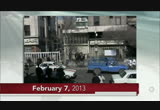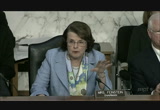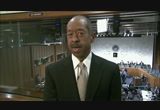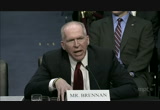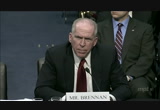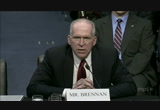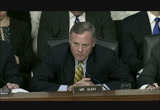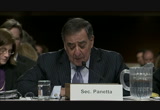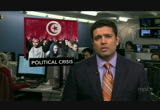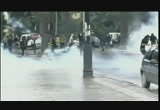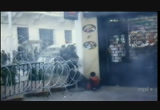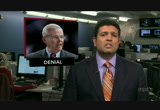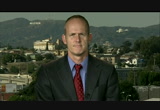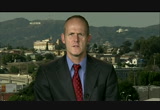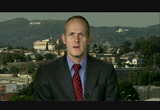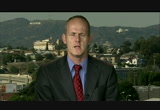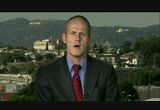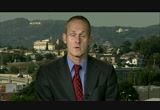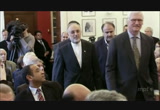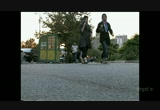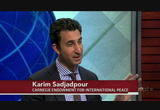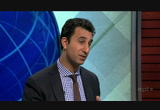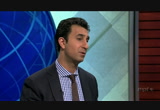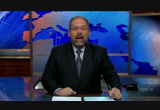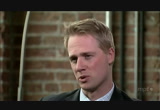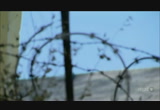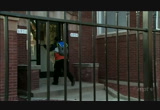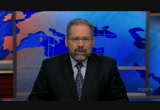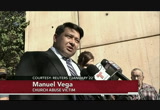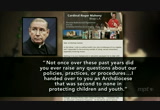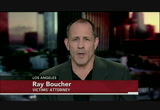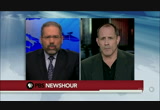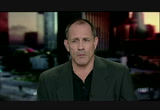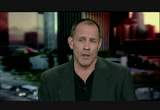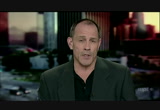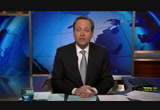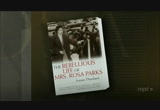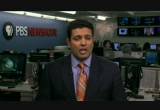tv PBS News Hour PBS February 7, 2013 6:00pm-7:00pm EST
6:00 pm
captioning sponsored by macneil/lehrer productions >> brown: john brennan, president obama's choice to head the c.i.a. faced a volley of questions from senators today about counter-terrorism policies, including waterboarding and drone strikes. good evening, i'm jeffrey brown. >> suarez: and i'm ray suarez. on the "newshour" tonight, we excerpt today's testimony, which was interrupted from the start by protesters from the anti-war group, code pink. >> brown: then, we get the latest on the massive manhunt for a former los angeles police office wanted for murder. >> suarez: we turn to iran as the u.s. tightens sanctions but tehran shows no signs of halting its nuclear program or engaging in talks. >> brown: from our american graduate series, we have the story of a chicago non-profit that aims to change the lives of would-be dropouts.
6:01 pm
>> what's interesting about one goal is that it pinpoints and targets low-income, underperforming students in non- selective chicago public schools, students who are least likely to graduate from high school, let alone college. >> suarez: we look at newly released documents showing leaders in the catholic church in los angeles shielded pedophile priests and failed to report allegations of child abuse. >> brown: and gwen ifill talks with biographer jeanne theo- haris, who offers a complex ait of the woman best known for refusing to give up her seat on an alabama bus in 1955. >> she is celebrated for one act and i think part of that celebration puts it all in the past, right, when the actual rosa parks keeps working on racial and social justice issues all the way up to the end of her life. >> brown: that's all ahead on tonight's "newshour." >> major funding for the pbs newshour has been provided by:
6:02 pm
♪ ♪ moving our economy for 160 years. bnsf, the engine that connects us. >> and by the alfred p. sloan foundation. supporting science, technology, and improved economic performance and financial literacy in the 21st century. >> and with the ongoing support of these institutions and foundations. and... >> this program was made possible by the corporation for public broadcasting. and by contributions to your pbs station from viewers like you. thank you. >> brown: the man picked to lead
6:03 pm
the central intelligence agency was called today to defend his positions in the war on terror. john brennan's senate confirmation hearing revolved around several hotly debated policies. "newshour" congressional correspondent kwame holman has our report. >> reporter: even before the hearing got truly under way, protesters from code pink disrupted john brennan's opening statement-- signaling that passions were running high on the targeted killings of terror suspects. >> they won't even tell congress what countries we are killing children in. >> reporter: the interruptions continued, and the chair of the senate intelligence committee, california democrat dianne feinstein, ordered the room temporarily cleared. >> we're going to halt the hearing. >> reporter: once the hearing resumed, brennan defended u.s. actions in the war on terror, but he acknowledged the c.i.a. is not immune from scrutiny. >> i have publicly acknowledged
6:04 pm
that our fight against al queda and associated forces has sometimes involved the use of lethal force outside the hot battle field of afghanistan. accordingly it is understandable there is great interest in the legal basis as well as the thresholds, criteria, processes, procedures, approvals and review for such actions. i have strongly promoted such public discussion with the congress, and with the american people as i believe our system of government and our commitment to transparency demand nothing less. >> reporter: late wednesday, mr. obama directed that the house and senate intelligence committees be given a classified memo on drone strikes abroad. it lays out the legal rationale for targeting american terrorism suspects. brennan has helped manage the program. oregon democrat ron wyden had pressed for release of the memo. he went directly to the issue during his first pass at questioning brennan.
6:05 pm
>> what should be done next to ensure that public conversation about drones so american people are brought into debate and have full understand what rules the government is going to observe when it conducts targeted killings. >> this hearing is one of the i think there is a misimpression on some of the am people that we take strikes to punish terrorists for past transgressions. nothing could be further from the truth. we only take such actions as a last resort to save lives when there is no other alternative to taking an action that's going to mitigate that threat. so we need to make sure there's an understanding, and the people that were standing up here today. i think they really have a misunderstanding of what we do as a government and the care we take, the agony we go through to make sure we do not have any collateral injuries or deaths. >> reporter: brennan is a 25- year veteran of the c.i.a., and now the president's counter-
6:06 pm
terror advisor. his name first surfaced as a candidate for director in 2008, but he withdrew amid questions about his past statements on enhanced interrogation, especially waterboarding. michigan democrat carl levin took up that issue today. >> my question is this: in your opinion, does waterboarding constitute torture? >> the attorney general has referred to waterboarding as torture. many people have referred to it as torture. and as you well know and as we've had the discussion senator, the term torture has a lot of legal and political implications. it is something that should have been banned long ago. it is something that should never have taken place in my view. and therefore, if i were to go to c.i.a. it would never be brought back. >> reporter: but republican saxby chambliss of georgia wanted to know if brennan stood by previous comments that harsh interrogations produced results. >> in a november 2007 interview you said that info from the interrogation techniques quote saved lives close quote. but you also say that c.i.a.
6:07 pm
should be out of the detention business, the main benefit that your view seems to be that even if we could save american lives by detaining more terrorists using only traditional techniques it would be better to kill them with a drone or let them go free rather than detain them, can you explain the logic in that argument? >> i respectfully disagree with that senator, i never believe it's better to kill a terrorist than to detain him, we want to detain as many terrorists as possible so we can elicit the intelligence from them in an appropriate manner so that we can disrupt follow on terrorist attacks. i clearly had the impression as you say when i was quoted in 2007 that there was valuable intel that came out from those interrogation sessions, that's why i did say that they save lives. i must tell you senator reading this report from the committee raises serious questions about the info i was given at the time and the impression i had at the time. now i have to determine what based on that information as well as what c.i.a. says what
6:08 pm
the truth is, and at this point senator, i do not know what the truth is. >> reporter: north carolina republican richard burr zeroed in on c.i.a. leaks pressing brennan for his position on publicly sharing covert operations. >> do you think that there is any situation where it's legal to disclose to the media or the public these tales of covert action programs? >> i do not think it is ever apropriate to improperly disclose classified info to anybody who does not have legitimate access to it and has the clearances for it. >> could you provide to the committee any times you were given the authority to release classified information? >> i have never provided classified information to
6:09 pm
reporters. i engage in discussions with reporters about classified issues that they might have had access to because of unfortunate leaks of classified information. and i frequently work with reporters if not editors of newspapers to keep out of the public domain some of this country's most important secrets. and so i engage with them on those issues. but after working in the intelligence profession for 30 years and being at c.i.a. for 25 years, i know the importance of keeping those secrets secret. >> reporter: despite the close scrutiny of administration policies, brennan is expected to win confirmation by the intelligence panel, and the full senate. >> suarez: online, find margaret warner's blog post about the impact brennan has had on the nation's counter-terrorism policy. and still to come on the "newshour": searching for an ex-police officer; tightening sanctions on iran; creating support systems for at-risk students; releasing documents about child abuse in los angeles and re-examining the life of rosa parks.
6:10 pm
but first, the other news of the day. here's hari sreenivasan. >> sreenivasan: for the first time, pentagon leaders said today they had supported arming the rebels in syria. defense secretary leon panetta and general martin dempsey chair of the joint chiefs said they made that recommendation to president obama. panetta told a senate hearing that, in the end, the president decided against sending in arms. instead, the u.s. has provided only humanitarian aid to the rebels. secretary panetta also defended the military's response to the attack on the u.s. consulate in benghazi, libya. the assault killed ambassador chris stevens and three other americans. panetta testified there'd been no specific warning of an imminent attack, so u.s. forces were too far away to respond. >> the united states military, as i've said, is not and frankly should not be a 911 service capable of arriving on the scene within minutes to every possible contingency around the world. the u.s. military has neither
6:11 pm
the resources nor the responsibility to have a firehouse next to every u.s. facility in the world. >> sreenivasan: republican senator john mccain of arizona argued the military could have deployed in time, if it had heeded warnings coming from the consulate and ambassador stevens. a 21-year-old bangladeshi man pleaded guilty today to plotting to blow up the federal reserve bank in new york. quazi nafis was arrested in october after an f.b.i. sting operation. prosecutors said he drove a van to the door of the bank and tried to set off what he thought was a bomb. in fact, the van was carrying dummy explosives supplied by an f.b.i. agent. nafis faces 30 years in federal prison. in tunisia, new protests broke out in the capital, demanding the end of the government. it was the second day of unrest sparked by the killing of a leading opposition figure. we have a report narrated by jonathan rugman of "independent television news." >> reporter: in tunis today, crowds converged on the interior ministry on the same spot where the so-called arab spring began
6:12 pm
two years ago. "the people want the downfall of the regime" the chant once again. but this time the tear gas came from police loyal not to a dictator but to tunisia's democratically elected government, one which now stands accuse of complicity in political assassination. the victim was chokri belaid, shot outside his home yesterday by a gunman on a motorbike. belaid had appeared on television the night before he died. the s.e.c. tar politician told his interview that tunisia's governing islamist party harbored religious factions which incited violence. his killing prompted the biggest explosion of anger since the revolution itself. groups claiming that revolution had been stolen by islamists who would stop at nothing to eliminate their enemies.
6:13 pm
last night the prime minister told tunisians he would replace his cabinet with a political technocrat. but today his islamist party said it hadn't been consulted and his ministers were not going anywhere. chokri belaid's family and friends gathered at his coffin and said his requests for state protection had been ignored and that islamists not only tolerated radicals but secretly supported them. it's possible that salafist extremists acted alone. this tunisian cleric was recorded threatening belaid. "come here and see what the people will do to you" he says here. whatever the truth, belaid's death is resonating across the arab world where new freedoms pose new dangers, political islam out of the shadows but triggering unrest. >> sreenivasan: tunisia's main
6:14 pm
labor union called today for a general strike on friday. belaid's funeral is also set for friday, raising fears of confrontations across the north african nation. at least 53 people were killed in zambia today when a bus smashed into a tractor-trailer and a car. video from the scene showed rescuers combing through tangled wreckage. hours after the crash, they were still searching for victims. the african nation's information minister said in addition to the dead, more than 20 people were hurt. the extent of government corruption in afghanistan improved slightly last year, but the cost went up, anyway. a united nations survey out today found 50% of afghans reported paying a bribe in 2012, down 9% from 2009. but the total of the bribes hit $3.9 billion up 40%. president hamid karzai has vowed to clean up corruption within his government. u.s. senator robert menendez denied today that he improperly intervened in a medical billing dispute to help his leading political donor. the new jersey democrat acknowledged contacting medicare officials to ask about billing practices. at the time, the program was embroiled in a dispute
6:15 pm
with dr. salomon melgen, an ophthalmologist in florida. melgen has contended he never tried to defraud medicare. the f.b.i. searched his offices last week. wall street was back on the losing side today, as its up and down week continued. the dow jones industrial average lost 42 points to close at 13,944. the nasdaq fell three points to close at 3,165. those are some of the day's major stories. now, back to ray. >> suarez: thousands of police across southern california, arizona, nevada and even in mexico are conducting a manhunt tonight, for a one-time police officer wanted in a shooting rampage. the suspect is christopher dorner, a 33-year-old former los angeles officer fired in 2009. dorner allegedly shot an officer in corona, california overnight 20 minutes later, police said, he pulled up to a police car in nearby riverside and opened fire on two other officers, killing one. on sunday, he allegedly murdered a couple in irvine california. the woman was the daughter of a
6:16 pm
former l.a.p.d. officer. los angeles police chief charlie beck said today that dorner's experience makes him much more dangerous. >> of course he knows what he's doing. we trained him. he was also a member of the armed forces. it is extremely worrisome and scary, especially to the police officers involved. the riverside officers were cowardly ambushed. they had no opportunity to fight back. no pre-warning. imagine going about your work day having to worry about that threat. >> suarez: law enforcement authorities say they believe dorner is stalking people he named in an online manifesto. for more, i am joined by frank stoltze, who has been covering the story for southern california public radio. franc stoltze welcome. have you ever seen a response of this side and could you ever
6:17 pm
describe its extent? >> it's an extraordinary response. as you mentioned, thousands of police officers-- not just with the los angeles police department but with agencies throughout southern california-- are searching for dorner and several law enforcement officers have told me this is the biggest ever hundredth ever. the reason is because he has law has military trainingnd he's a and that's what makes him so dangerous. obviously he's already killed three people and he has sthetd in this manifesto that he intends to kill more. >> suarez: looking again at that manifesto, is this also an explanation for the roots of his anger? these are being call red veng killings. does it begin with his dismissal from the los angeles police department? >> it seems to. he was fired in 2008 and he was fired because he lied about a fellow officer. he claim that that officer beat
6:18 pm
up a suspect and the department found that he lied about that and fired him. and the first victim -- one of the first two two victims in this case is the daughter of retired l.a.p.d. captain who represented him in that disciplinary hearing. so he feels like this captain, this former captain sort of helped him out of the department failed to properly defend him, that's why he killed his daughter and her boyfriend. that does seem to be the beginning of in the 2008. why he launched the killing spree now is unknown. >> suarez: there have been reported sightings over a broad area. what's the most recent place that he's been reliably located? $well, this is one of the other interesting aspects of this case. he was reported in san diego, reportedly tried to steal a boat
6:19 pm
and flee to mexico. the rope got tied into the propeller and so he was unable to get away. he was reported to have been at the airport. some of his belongings were found at the san diego airport and now in the last hour or so he -- his truck was found burning up at big bear. they haven't confirmed that it's his truck but it matches all the descriptions of his truck. so now police are focusing their manhunt in the mountains above los angeles, the san bernardino mountains. it is snowy, they have swat teams up there. they have closed the very popular ski resort, the big bear ski resort and they are focusing now on -- in the snowy mountains of san bernardino. >> suarez: one thing he hasn't done gone to ground, gone to silence. along with this manifesto you mentioned he's apparently been
6:20 pm
contacting well-known people in southern california. are they watching those people closely or giving them extra protection? >> reporter: they're mostly focusing the protection on the police officers and their families that he name in that manifesto that he said he would kill. in fact, more than 40 special protection details have been sent out from the los angeles police department to protect people. so they're worried that he will show up. not just at some of these homes but also at police facilities. they have beefed up security at police headquarters, at the police academy, at all police stations. and, in fact, they're not even allowing motorcycle officers to go out because they're afraid that they're more vulnerable and all patrol cars now are staffed by two, not one, officer. >> suarez: you mentioned the large number of personnel being devoted to this task, this search. but southern california is a
6:21 pm
vast area and, of course, parts of western arizona as well. how do you look for a guy? have police described what they're up to in keeping an eye out for mr. dorner? >> well, first of all you put a lot of resources on it, a lot of manpower, and that's what they've done. but one official mentioned the anti-terrorism center here in southern california, the joint regional intelligence center, that that septemberer is the one that sent out sort of the all points bulletin for dorner yesterday so it seems like they're using not just local resources but federal police resources. >> suarez: frank stoeshlgtsz thanks for joining us.
6:22 pm
>> brown: a back and forth over negotiations, continued concern over nuclear proliferation, and ramped-up sanctions: we turn next to u.s. relations with iran. the most recent talk of direct talks between the u.s. and iran began at a security summit in germany last saturday. vice president joe biden told the gathering that discussions on iran's nuclear program are still possible. >> we have made it clear at the outset that we would not, that we would be prepared to meet bilaterally with the iranian leadership. that offer stands, but it must be real and tangible and there has to be an agenda that they are prepared to speak to. we are not just prepared to do if for the exercise. >> brown: in berlin, two days later, iranian foreign minister ali akbar salehi suggested his government also favors direct talks with washington. >> i think it's about time that
6:23 pm
both sides really get into engagement. because confrontation certainly is not the way. iran's supreme leader ayatollah >> brown: but in tehran today, iran's supreme leader ayatollah ali khamenei firmly dismissed the idea. he accused the u.s. of holding a gun to iran's head, in the form of sanctions and ruled out talks. >> ( translated ): negotiations as a tactic, talk as a tactic, a gesture of superpower, is only a deceptive move. this is not a real move. talks are intended to prove good will. you do a dozen of things revealing your bad will, and then verbally say let's talk! can the iranian nation trust that you have any good will? day after the u.s. announced >> brown: khamenei spoke out one day after the u.s. announced more sanctions, limiting, among other things, iran's access to foreign revenue from oil sales. for more i'm joined by karim sadjadpour, senior associate in the middle east program at the carnegie endowment for international peace.
6:24 pm
were those -- are these mixed signals from iran or is it pretty clear snowed. >> well, i think perennial challenge we've had in our deals with iran is that those iranians who want to talk to american can't deliver and those iranians who can deliver don't want to talk to america. and the person who needs to deliver in this case is the supreme leader, ali khamenei. and he's been incredibly consistent for the last 24 years since he became supreme leader. >> brown: consistent? >> incredibly consistent in almost a weekly basis since 1989 pressing his contempt and mistrust of the united states. >> brown: what about the overture by joe biden? surprise or -- a feeler? how much do we know about the u.s. attempt here? >> well, this obama administration between president obama, joe biden, secretary of state john kerry, potential secretary of defense chuck hagel i would argue, is the most pro iran engagement u.s. national
6:25 pm
security cabinet since the 1979 revolution. this is an administration which desperately does want to do a deal with iran to diffuse the nuclear issue and to gradually reduce our footprint in the middle east. they certainly don't want to the go to war. and i'm not sure if ayatollah khamenei understands this is going to be the best deal he's going to get from the united states. >> suarez:. >> brown: well, the demands for the u.s. and others seems fairly clear and the push for sanctions go on. the iranians say they want the sanctions lifted first. so have you heard anything that suggests it's a sort of vicious cycle in that regard? >> this has also been a perennial challenge that synchronizing negotiations, who makes the first overture, but it's not within the realm of possibilities that the u.s. congress or president obama is going to remove sanctions before the negotiations start and i do see the two sides still being
6:26 pm
quite far away before any resolution can be reached. >> brown: you do? you don't see any particular way around it at the moment? >> the way i look at these negotiations is that the best-case scenario is that we have another round of negotiations and i see these --. >> brown: you mean multilateral negotiations? >> exactly. the utility i see of talking to iran isn't to resolve our differences, i think that's unlikely, but to prevent what is now a cold war from deteriorating into a hot war. >> brown: tell us more about the new sanctions that were announced yesterday. what are they aimed at? >> iran is facing unprecedented sanctions both in terms of its depth and breadth. meaning you have central bank sanctions, sanctions against iran's central bank and you have remarkable multilateral buy in. europeans have stopped buying iranian oil, companies like japan, china, india have reduced the economic contact and the sanction which is were implemented yesterday is that
6:27 pm
iran has had a much more difficult time producing and exporting oil and oil is 80% of its export revenue. the sanction which is took effect yesterday make it much more difficult for iran to get paid for the oil it does export. so over the last several years their oil revenue has dropped more than 50%, inflation has skyrocketed, their currency has tail spined. but we still haven't seen that economic malaise have an impact on the supreme leader's nuclear calculation. >>. >> brown: what can be said as far as an impact the sanctions are having at this point? >> they've had an adverse effect on the population. people are having difficulty getting access to medicine. the quality of life for most people has dropped precipitously. but, again, the intent of sanctions is to try to subject iran to enough pressure so the leader will feel what i would
6:28 pm
describe as existential angst. that either he these do a flauk leer deal or the regime itself could be in peril. and there's no signs that he's feeling that. now, the challenge also with ayatollah khamenei is that he's a man who hasn't left the country since 1989. he's surrounded himself with these sycophants who don't necessarily give him full information so it's unclear whether he will appreciate the full magnitude of the situation he's in. and this, by the way, isn't necessarily unique to khamenei. i think being a dictator is a very lonely vocation and that's why often times dictatorships don't bend, they end up breaking >> brown: karim sadjadpour, thanks for the update. >> thank you. >> suarez: now, how one teacher- led program is making sure students at risk of dropping out of high school are not only getting their diploma, but going on to graduate from college as well.
6:29 pm
ashar quraishi of wttw chicago reports for our american graduate project. >> reporter: it's just after 9:00 a.m. when rachel bennett greets her third period students. then it's a high school spanish teacher here at perspective leadership academy. but this is the one class she teaches each day where nobody learns spanish. >> mostly what i do is to harass my kids to be their best selves at all times. >> reporter: bennett teaches a daily 40-minute class design bade nonprofit organizational organization called one goal. >> what are the next two steps you're working on? >> reporter: what's interesting about one goal is that it pinpoints and targets low-income underperforming students in non-selective chicago public schools. students who are least likely to graduate from high school let alone college. jeff nelson is the co-founder and c.e.o. of one goal. >> we're taking underperforming students that typically have a less than 10% chance of earning
6:30 pm
a bachelor's degree and right now 85% of our alumni in college are persisting. >> so we have approximately 40 minutes to get this done. >> reporter: one goal focuses on these students because nationally only 8% of ninth graders in low-income communities are expected to graduate from college by the age 25. that's in stark contrast to students from the highest income families where 32% will finish college in that same time. nelson says the cornerstone of one goal's methodology begins with recruiting and training exceptional teachers who in turn identify underperforming students with the least opportunity and the most potential. >> we believe and have seen empirical evidence that teachers matter most in education reform. and when we got started building one goal we realized that nationally and locally there were no college access or persistent presiders that were using exceptional teachers as the focal point of their work. >> reporter: so one goal has partnered with the chicago
6:31 pm
public schools and is currently in 23 of the district's high schools. the program hopes to be in half of all chicago high schools by 2017 and is already expanding nationally. here's how it works: a one goal teacher takes on a group of 25 students and sticks with them for three years beginning in their junior year of high school. the teacher's instruction focuses on three pillars: prepping students for a.c.t. test, guiding them as they apply to college and helping them develop specific leadership skills. >> the five leadership principles that we spend time working on are professionalism, ambition, resilience, integrity and resourcefulness. the reason those five fields are important to us is because those five working in concert are predictive of success in college. >> reporter: often, nelson says, these character traits come easily for students who have grown up in the city's roughest neighborhoods where they have already developed an inner strength remarkable for their age. >> often times those skill sets
6:32 pm
are not point pointed as assets. often times kids think that they walk into this environment with liabilities. we think it's completely opposite. >> reporter: once the students move on to college they stay in regular contact with their one goal teacher through their first year. the aim is not just to get kids into college but to equip them with the support system they need to finish. >> we've seen 20, 25 years of education reform in the united states. almost all of it has been directed in prek through 12 which has -- so we see that proliferation of charter schools we've seen early childhood interventions work, we've seen human capital providers, we've seen big city mayors like rahm emanuel take over education yet almost none of it has spread to higher education. so our country has begun to get college access right but we see huge dropout rates in college. >> reporter: cynthia barren is a coach with the university of illinois at chicago's principle training program, she has over 40 years of experience in
6:33 pm
chicago public schools. there's nothing better than the next step after high school and making them feel confident and comfortable in their academic skills, that they can do it. but along with that is also this ability to know what college life is going to be like, know what career readiness is about, know what life will be like when they graduate but also helping them to develop the network that will help them, then also how to anticipate those obstacles, what do they have to put in place? >> reporter: one goal student anthony knows something about obstacles. last year, his south side neighborhood ranked fourth among 77 communities for the number of violent crimes. according to the latest census numbers, nearly 26% of households leer below the poverty line and nearly one in five residents is unemployed. by his sophomore year, he was getting into trouble with a c average and was doing the bare
6:34 pm
minimum to get by and he was a new father. >> outside of school i didn't do nothing, sat on my butt, played games. i didn't use computers, i didn't use my time wisely. i did ignorant things. >> reporter: rachel bennett says through self-motivation and the support of one goal hallmon turned everything around. >> last quarter he had a 4.1 g.p.a.. with the weight of his a.p. it will class so he was doing that as a young father. he takes care of his two-year-old, sees her everyday, takes her to her doctor appointments. >> my one goal teacher always encouraged me like if you don't want to do nothing for yourself, do something for your baby, make a life for her. you want your child to have a better life than you already have so she's part of my motivation. >> reporter: anthony is in the final running far full ride slar to cornell university. it's the kind of ambition one goal hopes to instill in all of its students. >> if i don't leave and stay here it's not going to do
6:35 pm
nothing for my family so i'd rather go get an education and start on my career and bring them back towards them so i can raise a family take care of my daughter, take care of my mother also. i'm doing it for myself but for the family that i love. >> brown: on our website, you can find more on enrichment programs that work to get students not only to, but through college. "american graduate" is a public media initiative funded by the corporation for public broadcasting. >> suarez: we turn to the sexual abuse scandal that is shaking up the los angeles catholic archdiocese. last week, the diocese was forced to release 12,000 pages of documents about dozens of priests who are accused of molesting children, allegations that date back several decades. that led to a rare public rebuke of a top church official. it began with a sweeping settlement, involving more than
6:36 pm
500 people, in 2007. they said they'd been sexually abused by priests, and they won $660 million. raymond boucher was lead attorney for the plaintiffs. >> far more important than the money is a critical term of this settlement provides for transparency, for sunshine and for the release of the confidential files and personnel records of the priests that were involved in molesting so many children in the last five or so decades. >> suarez: lengthy court battles kept those files and records sealed for five more years. but some were finally made public last month, under a court order and more were released last week. the vast document dump included: letters to church officials from parents who claimed their child had been abused; checks from the archdiocese as payment for therapy sessions for priests and
6:37 pm
even a letter to pope john paul the second from one victim. the reams of material detailed that then-archbishop roger mahoney went to great lengths to shield priests accused of abuse. in one case, diocesan officials wrote to mahoney that a priest who acknowledged abusing young boys should be re-assigned, instead of getting therapy. "if he were to mention his problem with child abuse," the letter said, "it would put the therapist in the position of having to report him. he cannot mention his past problem." in a handwritten note, mahoney agreed, saying, "sounds good. please proceed!" some of the victims, including manuel vega said the cover-up is now clear for all to see. >> there are smells, there are touches, there are feelings; you have to put yourself into that moment to understand what the catholic church is protecting. this is what cardinal mahony, this is what bishop curry, this
6:38 pm
is what vicars of clergy, nuns, attorneys; this is what they all got together and spoke about and in secret made these deals to protect these priests. >> suarez: mahoney retired in 2011, to be succeeded by archbishop jose gomez. in a statement last week, gomez said, "the behavior described in these files is terribly sad and evil. there is no excuse, no explaining away what happened to these children." the full statement was later cardinal mahoney has now been stripped of all administrative duties. but he is still allowed to celebrate the sacraments and to continue with other duties for the vatican. and last friday, he posted a defiant response to archbishop gomez on his personal blog. it read in part: in the meantime, some abuse
6:39 pm
victims say some files still have not been released, but the archdiocese says it will comply fully by the court-ordered deadline, february 22. we take a close look at the documents and what they reveal about the church's handling of abuse claims with ray boucher, the lead attorney representing victims in the cases that lead to the files release. we asked the archdiocese of los angeles to join our conversation but they were not available. mr. boucher, now five and a half years or so since the settlement the documents are finally out. did they provide any missing pieces of the putz? did they tell you things you didn't already know? >> well, they certainly tell us in greater detail the horrific story of abuse and coverup that we long suspected and expected.
6:40 pm
they confirmed it but confirmed it in a depth that i don't think anybody could have ever understood or fully comprehended. >> suarez: when you say "confirmed it" does this directly link abuse claims to the highest members of it will archdioceseian hierarchy and their full knowledge that there were priests who were accused who were then not removed from their jobs? >> without question. these documents and files that go back five decades confirm that, in fact, the vatican, the cardinals, the vicars of clergy here in los angeles were all intimately involved with the coverup, providing sanctuary and immunity to priests and shifting phlegm parish to parish or state to state and sometimes country to country in order to protect them from being criminally prosecuted and in order to protect the image of the church.
6:41 pm
>> suarez: as diocese after diocese face this is problem, the question gets asked but i think it bears asking again: if someone is aware that there's an accusation of a serious crime or is aware that a crime has been committed, does law compel them to report it? >> without question, there's an absolute obligation to report crimes of this nature. we're talking about rape and sodny and sexual abuse at the worst levels and there was absolutely always in my mind an obligation to report this and the failure to do so makes you a co-conspirator somebody that's covering up criminal conduct and behavior that should be prosecuted. >> suarez: apart from an obligation, which we can talk further about, i guess, is it legally required? is not reporting a crime that you're aware of-- in this case a
6:42 pm
felony-- a crime itself. >> well, for those people that were mandatory reporters-- and for many years the leadership of the archdiocese in california were mandatory reporters-- is absolutely -- it would have been a crime for failure to report that. >> suarez: after these documents have been made public are there still people serving in the archdiocese of los angeles who may be open to prosecution for their behavior during the years in question? >> well, i know that the district attorney's office and the police here in los angeles are reviewing, combing through the files to determine whether there were, in fact, activities or conduct that took place during a period of time when the statute of limitations hasn't run. unfortunately, many of these crimes occurred in -- a decade or so ago so the statute of limitations has s likely run on virtually all if not all of
6:43 pm
them. >> suarez: can you give some some examples of individual priests or cases where the kind of behavior that's been alleged over a long period of time that in many cases the church denied was, in fact, going on? >> father miller, who served in various parishes throughout los angeles in the '70s there were complaints of sexual abuse relating to him. he admitted to the fact that he was sexually abusing children. he was sent for treatment at one of the treatment facilities of the catholic church and yet put back into ministry and continued the sexual abuse again. you have father cafoe who early on there were reports that children were being abused or suspected of being abused by him and yet no action was taken other than, again, to send him to treatment and then bring him back. father rodrigues in ventura, who
6:44 pm
went on to sexually abuse a whole family of young men after reports from the psychiatrists said very clearly he should never be around children and yet we have pictures of him saying children's only christmas mass. >> suarez: and the documents indicate this was done with the approval of fairly senior-ranking members in the archdiocese? >> certainly with the knowledge and understanding of the vicars of clergy and in most cases the cardinal himself. >> suarez: today do you feel that you know everything you need to know about what went on over the last 30 years or do you think there are cases that are still to come to life? >> oh, there's no question that there are a number of cases that have not come forward. there's thousands of victims that continue to suffer in silence that were abused by priests in los angeles. we know there are other priests whose names have not come out
6:45 pm
because there were no allegations brought forth during the opening of the statute of limitations that resulted in the release of these documents but they're still out there. clearly this is an important and substantive glimpse into a very deep and dark and ongoing problem within the catholic church and, frankly, in society itself. but it's simply a glimpse. it's by no stretch of the imagination the full picture. >> suarez: attorney ray boucher, thanks for joining us. >> thank you very much. >> suarez: you can read the recently released documents for yourself, find a link on our web site. >> brown: finally tonight, what you might not know about the life and legacy of a civil rights pioneer. gwen ifill has our book conversation. >> ifill: by the time rosa parks died in detroit in 2005, her place in the history books was assured. she was the first lady of civil rights, the mother of the
6:46 pm
freedom movement. mourners lined up in three cities to pay their respects in montgomery, alabama. at the u.s. capitol, where she was the first woman and only second african american to lie in honor. and in her adopted hometown of detroit, where her funeral ran for more than seven hours. everyone agreed that the 92- year-old parks had made history when she refused to give up her seat on a montgomery, alabama city bus in 1955. her arrest sparked a 382-day bus boycott that caught the attention of a movement and a nation. but there was more to rosa parks' action that day, which was neither as random or as isolated as it came to be seen. now, on the 100th anniversary of her birth, a new biography explores "the rebellious life of mrs. rosa parks". the author is jeane theoharis, a professor of political science at brooklyn college of the city university of new york.
6:47 pm
the word "rebellion" doesn't usually appear in what we think about rosa parks. >> right. and that's her word. she talks about having a life history of being rebellious, which is where the title comes from. and i think it gets at both the scope of her political life and then, right, the kind of character that we have come to sort of miss when we see just rosa parks on that one day. >> ifill: i know elementary school i was taught that she was a tired seem stress, her feet were tired, she sat down on the bus and didn't want to get up. later on the rumor was that she was an n.a.a.c.p. plant sent in to stir up trouble, but she was neither of these. >> no, she was neither of these and she would be the first to correct us if we were the first to say she was tired. because in her autobiography she says "the only tired i was was tired of giving in." she wasn't tired. this comes out of a long history of activism, this was not her first act against segregation and she very much sees this in
6:48 pm
6:50 pm
longer history of political work and act vichl. >> ifill: and part of the reason she chose to be the face is because she went for training. she didn't happen to be there that day. i mean, she happened to be there in that she was commuting home from work but she was trained in how to behave in a situation like that. >> right. so five months before she makes a stand on the bus she goes to highlander folk school in tennessee. and highlander is an adult kind of organizer training school trying to teach local people how to be leaders of their own movements and she goes a two-week workshop. she takes off work to go to a
6:51 pm
workshop on school desegregation and it's very much about the kind of power of the individual to go back and lead their own communities. interestingly, on the last day they do this go-round and ask "what are you going to do when you go back?" and she said "resistance in montgomery is too fierce, people are never going to be unify sod there's no mass movement that will emerge but i'm going to keep working with the young people." because she's formed a youth chapter of the montgomery n.a.a.c.p. so she very much is not hopeful that there will be a mass movement. yet five months later, december 1, 1955 in her words pushed as far as i could be pushed, sort of doing what i asked of others. so she sees herself in this community of activists. she refuses to give up her seat. >> ifill: i have to ask you, in putting this book together you found things we haven't seen before but there's more out there, isn't there? >> absolutely. so part of her paper -- she gives part of her papers in the late '70s to the library at
6:52 pm
wayne state and she refers to this as the first of her papers. but part of her personal papers are still here at an auction house. the probate judge in detroit gives it to an auction house to sell and it's beenally been sitting here for five years so there's a lot more -- no scholar has gotten to see those paper which is, again, i think is very disturbing. i don't think you could sell papers of martin luther king, of f.d.r., of sort of other important 20th century political figures without a scholar assessing the paper yet no scholar has gotten to assess her papers. and they are priced along with her effects very -- $8 to $10 million so it puts a lot of institutions that she cared about out of the running for those kind of things. >> ifill: you say two things in the book which i think most people would have to stop and think about. which is that the retelling of
6:53 pm
her life is that it was a pro rowe man tick fable and the other thing you talk about is her death and how it was a ritual of national redemption. what did you mean by those two things. >> she's celebrated for one act and then that puts it all in the past when the actual rosa parks keeps working on racial and social justice issues up to the end of her life. so she doesn't stop, she believes there's more change and yet the way that she's memorialized sort of seeks to kind of end it. to say we are a post-racial society when the actual rosa parks didn't think we were a post-racial society. so i use that sort of romantic fable because i think part of how we've got to use her story is a way to make ourselves feel so good about how far we've come as a nation and in many ways to ignore how far yet we have to go. >> ifill: jean theo haris, the author of "the rebellious life of rosa parks."
6:54 pm
>> brown: gwen continued her conversation with biographer theoharis. you'll find that and more in gwen's take on our home page. >> suarez: again, the major developments of the day: john brennan, the nominee for c.i.a. director, faced his senate confirmation hearing. he defended drone strikes overseas, including those targeting americans. for the first time, the top civilian and military leaders at the pentagon said they had recommended arming the rebels in syria. and thousands of police across southern california, arizona and nevada hunted for a one-time los angeles police officer wanted in a shooting rampage. never before have two african- americans served in the u.s. senate at the same time, until today. that story is online as hari sreenivasan explains. >> sreenivasan: there's a democrat and a republican. william "mo" cowan was sworn in today as massachusetts' new senator taking the seat vacated by secretary of state john kerry. he joins south carolina's tim scott, who was appointed in december after jim de mint
6:55 pm
retired. and on making sense, economist bob lerman proposes a solution to the youth unemployment crisis in the u.s.-- apprenticeships. all that and more is on our website newshour.pbs.org. >> suarez: and that's the "newshour" for tonight. i'm ray suarez. >> brown: and i'm jeffry brown. we'll see you online and again here tomorrow evening with mark shields and david brooks, among others. thank you for joining us. good night. >> major funding for the pbs newshour has been provided by: >> and the william and flora hewlett foundation, working to solve social and environmental problems at home and around the world. >> and with the ongoing support of these institutions and foundations. and... >> this program was made possible by the corporation for
6:56 pm
144 Views
IN COLLECTIONS
WMPT (PBS) Television Archive
Television Archive  Television Archive News Search Service
Television Archive News Search Service 
Uploaded by TV Archive on

 Live Music Archive
Live Music Archive Librivox Free Audio
Librivox Free Audio Metropolitan Museum
Metropolitan Museum Cleveland Museum of Art
Cleveland Museum of Art Internet Arcade
Internet Arcade Console Living Room
Console Living Room Books to Borrow
Books to Borrow Open Library
Open Library TV News
TV News Understanding 9/11
Understanding 9/11
